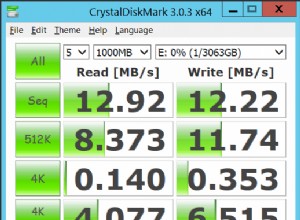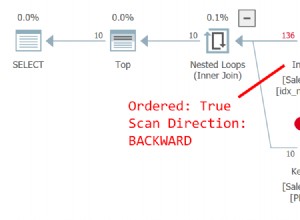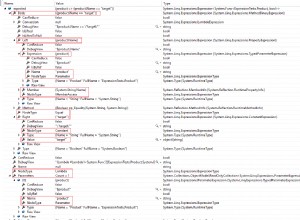ठीक है तो, मैंने इसे अपने सिस्टम के लिए हासिल करने के लिए एक माइग्रेशन लिखा है।
-
यह आपको डिफ़ॉल्ट के अलावा किसी अन्य कनेक्शन को संदर्भित करने के लिए वैकल्पिक रूप से एक कनेक्शन नाम निर्दिष्ट करने की अनुमति देता है।
-
यह एक
SHOW TABLES. का उपयोग करके कनेक्शन के डेटाबेस से तालिकाओं की सूची प्राप्त करता है क्वेरी। -
यह तब प्रत्येक तालिका के माध्यम से लूप करता है और सभी स्ट्रिंग/वर्ण प्रकार के कॉलम को नए वर्ण सेट और संयोजन में अपडेट करता है।
-
मैंने इसे इसलिए बनाया है ताकि यह निर्धारित करने के लिए कॉलबैक प्रदान किया जाना चाहिए कि कॉलम की लंबाई प्रदान की गई नई लंबाई में बदलनी चाहिए या नहीं। मेरे कार्यान्वयन में,
VARCHARऔरCHAR191 से अधिक लंबाई वाले स्तंभों को अप माइग्रेशन के दौरान लंबाई 191 करने के लिए अद्यतन किया जाता है औरVARCHARऔरCHARठीक 191 लंबाई वाले कॉलम को रिवर्स/डाउन माइग्रेशन पर लंबाई 255 पर अपडेट किया जाता है। -
एक बार सभी स्ट्रिंग/कैरेक्टर कॉलम अपडेट हो जाने के बाद, टेबल के चारसेट और कोलेशन को बदलने के लिए कुछ क्वेरीज़ चलाई जाएंगी, किसी भी शेष कोलाज को नए में बदलने के लिए और फिर टेबल के डिफॉल्ट चारसेट और कॉलेशन को बदलने के लिए।
-
अंत में, डेटाबेस के डिफ़ॉल्ट वर्णसेट और संयोजन को बदल दिया जाएगा।
नोट
-
मूल रूप से, मैंने टेबल को केवल नए एन्कोडिंग में बदलने की कोशिश की, लेकिन कॉलम की लंबाई के साथ समस्याओं में भाग गया। 191 वर्ण
utf8mb4. में अधिकतम वर्ण लंबाई है MySQL/MariaDB के मेरे संस्करण में InnoDB का उपयोग करते समय और तालिका संयोजन को बदलने के परिणामस्वरूप एक त्रुटि हुई। -
मैं पहले तो केवल लंबाई को नई लंबाई में अपडेट करना चाहता था, लेकिन मैं एक रोलबैक सुविधा भी प्रदान करना चाहता था, इसलिए यह एक विकल्प नहीं था क्योंकि रिवर्स विधि में मैं कॉलम की लंबाई निर्धारित कर रहा होता जो
utf8mb4255 तक, जो बहुत लंबा होता, इसलिए मैंने मिलान को भी बदलने का विकल्प चुना। -
फिर मैंने
varchar. की लंबाई, वर्णसेट और मिलान को बदलने की कोशिश की औरcharकॉलम जो बहुत लंबे थे, लेकिन मेरे सिस्टम में, इसके परिणामस्वरूप त्रुटियां हुईं जब मेरे पास ऐसे कॉलम शामिल थे जिनमें मल्टी-कॉलम इंडेक्स थे। जाहिर है, बहु-स्तंभ अनुक्रमणिका को समान संयोजन का उपयोग करना चाहिए। -
एक महत्वपूर्ण नोट इस पर यह है कि रिवर्स/डाउन माइग्रेशन सभी के लिए 100% सही नहीं होगा। मुझे नहीं लगता कि माइग्रेट करते समय मूल कॉलम के बारे में अतिरिक्त जानकारी संग्रहीत किए बिना ऐसा करना संभव होगा। इसलिए रिवर्स/डाउन माइग्रेशन के लिए मेरा वर्तमान कार्यान्वयन यह मान लेना है कि लंबाई 191 वाले कॉलम मूल रूप से 255 थे।
-
इसी तरह का एक महत्वपूर्ण नोट इस पर यह है कि यह सभी स्ट्रिंग/कैरेक्टर कॉलम के कोलाज को नए कॉलेशन में बदल देगा, मूल कॉलेशन की परवाह किए बिना, इसलिए यदि अलग-अलग कॉलेशन वाले कॉलम हैं, तो वे सभी नए में परिवर्तित हो जाएंगे और रिवर्स होगा वही, मूल को संरक्षित नहीं किया जाएगा।
<?php
use Illuminate\Database\Migrations\Migration;
class UpgradeDatabaseToUtf8mb4 extends Migration
{
/**
* Run the migrations.
*
* @return void
*/
public function up()
{
$this->changeDatabaseCharacterSetAndCollation('utf8mb4', 'utf8mb4_unicode_ci', 191, function ($column) {
return $this->isStringTypeWithLength($column) && $column['type_brackets'] > 191;
});
}
/**
* Reverse the migrations.
*
* @return void
*/
public function down()
{
$this->changeDatabaseCharacterSetAndCollation('utf8', 'utf8_unicode_ci', 255, function ($column) {
return $this->isStringTypeWithLength($column) && $column['type_brackets'] == 191;
});
}
/**
* Change the database referred to by the connection (null is the default connection) to the provided character set
* (e.g. utf8mb4) and collation (e.g. utf8mb4_unicode_ci). It may be necessary to change the length of some fixed
* length columns such as char and varchar to work with the new encoding. In which case the new length of such
* columns and a callback to determine whether or not that particular column should be altered may be provided. If a
* connection other than the default connection is to be changed, the string referring to the connection may be
* provided as the last parameter (This string will be passed to DB::connection(...) to retrieve an instance of that
* connection).
*
* @param string $charset
* @param string $collation
* @param null|int $newColumnLength
* @param Closure|null $columnLengthCallback
* @param string|null $connection
*/
protected function changeDatabaseCharacterSetAndCollation($charset, $collation, $newColumnLength = null, $columnLengthCallback = null, $connection = null)
{
$tables = $this->getTables($connection);
foreach ($tables as $table) {
$this->updateColumnsInTable($table, $charset, $collation, $newColumnLength, $columnLengthCallback, $connection);
$this->convertTableCharacterSetAndCollation($table, $charset, $collation, $connection);
}
$this->alterDatabaseCharacterSetAndCollation($charset, $collation, $connection);
}
/**
* Get an instance of the database connection provided with an optional string referring to the connection. This
* should be null if referring to the default connection.
*
* @param string|null $connection
*
* @return \Illuminate\Database\Connection
*/
protected function getDatabaseConnection($connection = null)
{
return DB::connection($connection);
}
/**
* Get a list of tables on the provided connection.
*
* @param null $connection
*
* @return array
*/
protected function getTables($connection = null)
{
$tables = [];
$results = $this->getDatabaseConnection($connection)->select('SHOW TABLES');
foreach ($results as $result) {
foreach ($result as $key => $value) {
$tables[] = $value;
break;
}
}
return $tables;
}
/**
* Given a stdClass representing the column, extract the required information in a more accessible format. The array
* returned will contain the field name, the type of field (Without the length), the length where applicable (or
* null), true/false indicating the column allowing null values and the default value.
*
* @param stdClass $column
*
* @return array
*/
protected function extractInformationFromColumn($column)
{
$type = $column->Type;
$typeBrackets = null;
$typeEnd = null;
if (preg_match('/^([a-z]+)(?:\\(([^\\)]+?)\\))?(.*)/i', $type, $matches)) {
$type = strtolower(trim($matches[1]));
if (isset($matches[2])) {
$typeBrackets = trim($matches[2]);
}
if (isset($matches[3])) {
$typeEnd = trim($matches[3]);
}
}
return [
'field' => $column->Field,
'type' => $type,
'type_brackets' => $typeBrackets,
'type_end' => $typeEnd,
'null' => strtolower($column->Null) == 'yes',
'default' => $column->Default,
'charset' => is_string($column->Collation) && ($pos = strpos($column->Collation, '_')) !== false ? substr($column->Collation, 0, $pos) : null,
'collation' => $column->Collation
];
}
/**
* Tell if the provided column is a string/character type and needs to have it's charset/collation changed.
*
* @param string $column
*
* @return bool
*/
protected function isStringType($column)
{
return in_array(strtolower($column['type']), ['char', 'varchar', 'tinytext', 'text', 'mediumtext', 'longtext', 'enum', 'set']);
}
/**
* Tell if the provided column is a string/character type with a length.
*
* @param string $column
*
* @return bool
*/
protected function isStringTypeWithLength($column)
{
return in_array(strtolower($column['type']), ['char', 'varchar']);
}
/**
* Update all of the string/character columns in the database to be the new collation. Additionally, modify the
* lengths of those columns that have them to be the newLength provided, when the shouldUpdateLength callback passed
* returns true.
*
* @param string $table
* @param string $charset
* @param string $collation
* @param int|null $newLength
* @param Closure|null $shouldUpdateLength
* @param string|null $connection
*/
protected function updateColumnsInTable($table, $charset, $collation, $newLength = null, Closure $shouldUpdateLength = null, $connection = null)
{
$columnsToChange = [];
foreach ($this->getColumnsFromTable($table, $connection) as $column) {
$column = $this->extractInformationFromColumn($column);
if ($this->isStringType($column)) {
$sql = "CHANGE `%field%` `%field%` %type%%brackets% CHARACTER SET %charset% COLLATE %collation% %null% %default%";
$search = ['%field%', '%type%', '%brackets%', '%charset%', '%collation%', '%null%', '%default%'];
$replace = [
$column['field'],
$column['type'],
$column['type_brackets'] ? '(' . $column['type_brackets'] . ')' : '',
$charset,
$collation,
$column['null'] ? 'NULL' : 'NOT NULL',
is_null($column['default']) ? ($column['null'] ? 'DEFAULT NULL' : '') : 'DEFAULT \'' . $column['default'] . '\''
];
if ($this->isStringTypeWithLength($column) && $shouldUpdateLength($column) && is_int($newLength) && $newLength > 0) {
$replace[2] = '(' . $newLength . ')';
}
$columnsToChange[] = trim(str_replace($search, $replace, $sql));
}
}
if (count($columnsToChange) > 0) {
$query = "ALTER TABLE `{$table}` " . implode(', ', $columnsToChange);
$this->getDatabaseConnection($connection)->update($query);
}
}
/**
* Get a list of all the columns for the provided table. Returns an array of stdClass objects.
*
* @param string $table
* @param string|null $connection
*
* @return array
*/
protected function getColumnsFromTable($table, $connection = null)
{
return $this->getDatabaseConnection($connection)->select('SHOW FULL COLUMNS FROM ' . $table);
}
/**
* Convert a table's character set and collation.
*
* @param string $table
* @param string $charset
* @param string $collation
* @param string|null $connection
*/
protected function convertTableCharacterSetAndCollation($table, $charset, $collation, $connection = null)
{
$query = "ALTER TABLE {$table} CONVERT TO CHARACTER SET {$charset} COLLATE {$collation}";
$this->getDatabaseConnection($connection)->update($query);
$query = "ALTER TABLE {$table} DEFAULT CHARACTER SET {$charset} COLLATE {$collation}";
$this->getDatabaseConnection($connection)->update($query);
}
/**
* Change the entire database's (The database represented by the connection) character set and collation.
*
* # Note: This must be done with the unprepared method, as PDO complains that the ALTER DATABASE command is not yet
* supported as a prepared statement.
*
* @param string $charset
* @param string $collation
* @param string|null $connection
*/
protected function alterDatabaseCharacterSetAndCollation($charset, $collation, $connection = null)
{
$database = $this->getDatabaseConnection($connection)->getDatabaseName();
$query = "ALTER DATABASE {$database} CHARACTER SET {$charset} COLLATE {$collation}";
$this->getDatabaseConnection($connection)->unprepared($query);
}
}
कृपया, कृपया इसे चलाने से पहले अपने डेटाबेस का बैकअप लें . अपने जोखिम पर प्रयोग करें!




